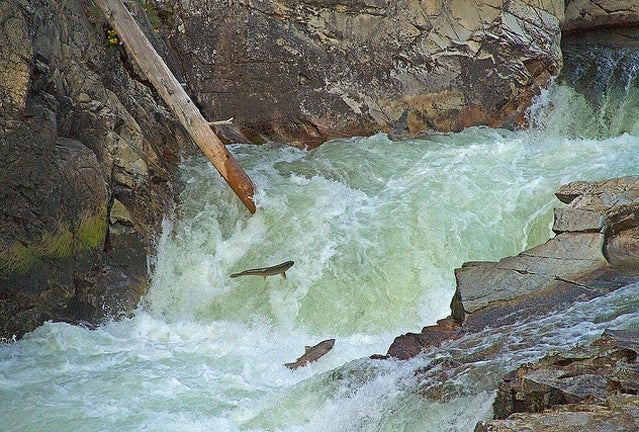
The Elwha Dam is gone. The Glines Canyon Dam is nearly gone. With the dams no longer blocking fish from their migratory route up the river, Chinook (king) and other species of salmon and trout are returning. Salmon fry began hatching above the dams early this spring and now biologists have spotted the first adult Chinooks.
“We knew this was going to happen and as I saw the fish roll, my heart jumped!” Phil Kennedy, lead fisheries technician for the Olympic National Park, said in a statement announcing the return.
He's certainly not alone in his enthusiasm. “If Elwha River ecosystem recovery has a poster child, it is this fish,” on September 17, 2011. “Bringing back the Elwha River kings, the most storied in Puget Sound, has been a rallying cry for advocates of dam removal for more than a generation.”
But the rehabilitation process has not been all rainbows and unicorns. There is tension, disagreement and even litigation regarding the ways the river's fish stocks should be renewed.
In building the dams, which blocked 70 miles of fish habitat, the native salmon and steelhead trout runs were obliterated. This was a theft, essentially, of the Lower Elwha Klallam Tribe's sustenance. So the tribe sees rebuilding the river's fish stocks as an as-soon-as-possible priority. Toward that end, it wanted to introduce non-native steelhead to the Elwha as early as this spring. But a consortium of biologists raised red flags, saying that such a practice could hurt the natural rebound of native species in the river.
Conservation groups against the feds and the tribe, seeking to stop the hatchery-raised fish from being introduced. It worked to a degree and the tribe agreed in late February to hold off on introducing the fish in 2012.
Meanwhile, the Washington Department of Fish and Wildlife and federal agencies that are overseeing Elwha river restoration efforts are working on a management plan that will attempt to address both the tribe's interests and efforts to foster native species' attempts to reclaim the waters. That might prove to be an upstream battle.
—Mary Catherine O'Connor